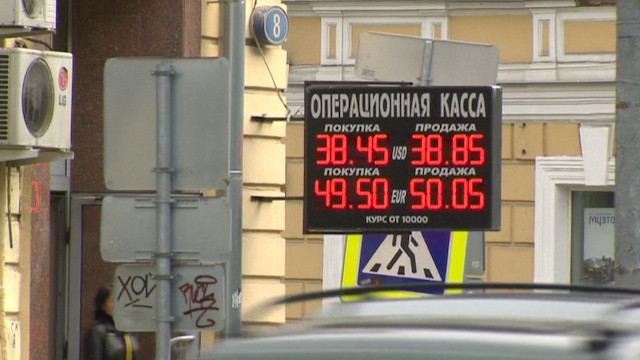Russian Rouble Tanks Despite $13bn Foreign Currency Injection

Despite selling almost $13bn in government debt this month, the Russian ruble is continuing to flounder, reaching record low levels.
Pitted against the dollar-euro basket monitor the Kremlin prefers, the ruble fell to 46.3096 – more than half a percentage point down on yesterday's rate, which was also a record low.
President Vladimir Putin is in Milan today (17 October), meeting with European leaders to discuss the bilateral sanctions regime and the increasingly fraught relationship between Russia and the European Union.
The currency's latest dip emphasises the severity of Russia's economic difficulties, with plummeting oil prices shredding any hopes Moscow had of riding out the storm caused by economic, financial and trade sanctions.
The ruble has now lost almost 20% of its value against the dollar in 2014, with the lack of foreign currency available to Russian banks being restricted due to an EU ban on capital raising within its markets by Russian banks and companies that have a government ownership stake of 50% or more.
Many of these companies' western debt is due to mature over the next 12 months, with the Russian Central Bank likely to have to step in to replace those lines of credit. On Thursday, the bank said it would pump up to $50bn into the banking sector by the end of 2016 in an effort to stymy the effects of borrowing bans.
The $50bn will come in the form of an auction of foreign currency repos – a form of short-term borrowing for dealers in government securities – beginning on 29 October. The repos will be either one-week or one-month in tenor, adding much-needed forex liquidity to Russia's banking sector.
Some analysts have warned that the headline figure of $50bn is slightly misleading, given the timescales over which it will be delivered.
"What's more, the auctions will be capped at $3.5bn per week ($2bn in one-week repos, $1.5bn in one-month repos). To put that into context, the private sector faces external debt servicing costs of more than $170bn between November this year and Q1 2016 (the latest available data). External debt servicing costs to the end of this year alone will total nearly $45bn," wrote Neil Shearing, the chief emerging markets economist at Capital Economics in a note.
He added that "with oil prices falling and capital outflows continuing, we suspect the CBR will be forced to extend it in the months ahead".
Experts within Russia expressed similar fears. In an email exchange with Bloomberg, Aram Kazaryan, a foreign exchange trader at MDM Bank in Moscow, said: "The size of the announced offering was lower than what's needed. It's still easier for banks to buy the dollar on the spot market rather than borrow from the central bank."
The Russian government has suggested that it will make budget cuts in other areas of the economy in order to paper over the hole left by lost oil revenues. For every dollar that comes off the price of a barrel of oil, it's thought the Russian economy loses $2bn.
Given the likelihood that sanctions are going to remain in place, in the words of one analyst: "The drop in the oil price has come at the worst of times."
© Copyright IBTimes 2025. All rights reserved.






















